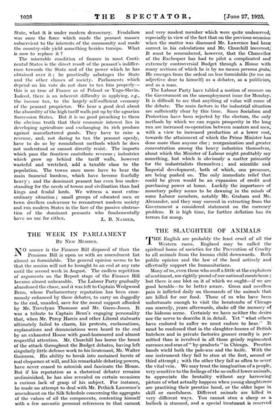THE WEEK IN PARLIAMENT BY NEW ME3IBER.
NO sooner is the Finance Bill disposed of than the Pensions Bill is upon us with an amendment list almost as formidable. The general opinion seems to be that the session will not be brought to an end at any rate until the second week in August. The endless repetition of arguments on the Report stage of the Finance Bill became almost unbearable. The Labour Party gradually abandoned the chase, and it was left to Captain Wedgwood Benn, whose Parliamentary reputation has been enor- mously enhanced by these debates, to carry on doggedly to the end, unaided, save for the moral support afforded by Mr. Trevelyan Thomson and Mr. Garro-Jones. It was a tribute to Captain Benn's engaging personality that, when Mr. Percy Harris and other Liberal stalwarts ultimately failed to charm, his protests, exclamations, explanations and denunciations were heard to the end by an exhausted House with good-humoured and almost respectful attention. Mr. Churchill has borne the brunt of the attack throughout the Budget debates, having left singularly little defence work to his lieutenant, Mr. Walter Guinness. His ability to break into sustained bursts of real eloquence at will, and his remarkable debating powers, have never ceased to astonish and fascinate the House. But if his reputation as a rhetorical debater remains undiminished, he has also revealed on certain occasions a curious lack of grasp of his subject. For instance, he made no attempt to deal with Mr. Pethick Lawrence's amendment on the Silk Schedule concerning the aggregate of the values of all the components, contenting himself with a few sarcastic personal references to that earnest and very modest member which were quite undeserved especially in view of the fact that on the previous occasion when the matter was discussed Mr. Lawrence had bee( correct in his calculations and Mr. Churchill incorrectJ It must be remembered, however, that the Chancellor of the Exchequer has had to pilot a complicated and extremely controversial Budget through a House with many sections of which he is by no means persona grata4 He emerges from the ordeal no less formidable (to use an adjeCtive dear to himself) as a debater, as a politician,' and as a man.
The Labour Party have tabled a motion of censure on the Government on the unemployment issue for Monday; It is difficult to see that anything of value will come of the debate. The main factors in the industrial situation are sufficiently clear by this time. Since Socialism and Protection have been rejected by the electors, the only methods by which we can regain prosperity in the long run are increased co-operation between masters and men,' with a view to increased production at a lower cost; towards the attainment of which the Prime Minister has done more than anyone else ; reorganization and greater, concentration among the heavy industries themselves,' about which the Minister of Labour might profitably say something, but which is obviously a matter primarily/ for the industrialists themselves ; and scientific and Imperial development, both of which, one presumes, are being pushed on. The only immediate relief that could be given would be an expansion of credit and purchasing power at home. Luckily the importance of monetary policy seems to be dawning in the minds of some Labour members, notably Mr. Graham and Mr, Alexander, and they may succeed in extracting from the Government a considered statement on the currency. problem. It is high time, for further deflation has its terrors for many.










































 Previous page
Previous page